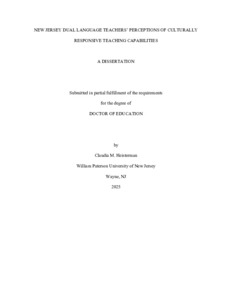Please use this identifier to cite or link to this item:
http://hdl.handle.net/20.500.12164/3509| Title: | New Jersey Dual Language Teachers’ Perceptions of Culturally Responsive Teaching Capabilities |
| Authors: | Heisterman, Claudia M. |
| Keywords: | Education;Educational leadership;Culturally responsive capabilities;Dual language;Professional development |
| Issue Date: | 21-Aug-2025 |
| Publisher: | William Paterson University |
| Abstract: | This study served to examine dual language teachers’ perceptions of culturally relevant capabilities in implementing culturally responsive teaching practices and explore the factors that influence their confidence in fostering inclusive, equitable learning environments. Grounded in Bandura’s self-efficacy theory and Gay’s framework for culturally responsive teaching, this quantitative descriptive study was an investigation of the impact of professional development, program type (one-way dual language [OWDL] vs. two-way dual language [TWDL]), and multilingualism on teachers’ perceptions of their efficacy in culturally responsive teaching. Findings indicate that targeted professional development significantly enhances teachers’ confidence in applying culturally responsive teaching strategies, reinforcing the necessity for structured training that connects theory and practice. Conversely, program type and multilingualism were not significant predictors of self-efficacy, suggesting that while these factors may shape teachers’ experiences, they do not directly determine their perceived ability to implement culturally responsive pedagogy. This study contributes to the growing body of literature on culturally responsive teaching by emphasizing the importance of continuous professional learning in preparing teachers to address the diverse cultural and linguistic needs of students. The findings have implications for policy and practice, highlighting the necessity of professional development initiatives that equip teachers with practical strategies for fostering inclusive classrooms. Future research should include the long-term effects of professional development on culturally responsive teaching, the role of school leadership in supporting culturally responsive pedagogy, and systemic factors affecting teachers’ self-efficacy. By prioritizing these areas, teachers, and policymakers can strive toward a more equitable and culturally affirming educational system. |
| URI: | http://hdl.handle.net/20.500.12164/3509 |
| Appears in Collections: | Theses & Dissertations |
Files in This Item:
| File | Description | Size | Format | |
|---|---|---|---|---|
| Heisterman_CulturallyResponsiveTeaching.pdf | 2.04 MB | Adobe PDF |  View/Open |
Items in DSpace are protected by copyright, with all rights reserved, unless otherwise indicated.
